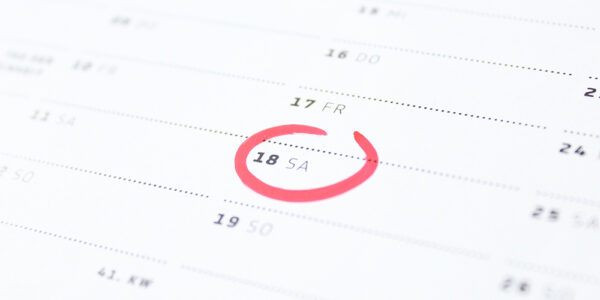Text appointment reminders can be a valuable tool for businesses of all sizes. By creating a system where customers know their scheduled appointments, they are less likely to miss them or have to wait long periods of time. Additionally, text appointment reminders can help reduce the number of phone calls that need to be made in order to reschedule someone’s appointment.
Text appointment reminders are also hugely valuable in a healthcare context. Data shows that simply by implementing text appointment reminders, patient satisfaction increases and operational inefficiencies decrease.
If you’re still on the fence about implementing text appointment reminders at your practice, we totally understand.
They’re relatively new in the healthcare space, after all! But here’s some concrete evidence as to why you may want to consider adding SMS reminders to your patient communication toolkit.
Elements of a Great Appointment Reminder Text
To make sure that you’re getting the most out of text appointment reminders right off the bat, you want to make sure you cover all your bases.
- Always include the date, time, and address of the appointment in your text message reminders.
- Ask every patient to confirm their appointment, or reschedule if necessary.
- Once the appointment has been confirmed, remind patients to bring required documentation or any necessary materials.
There are numerous benefits of SMS appointment reminders; they’re easy to use, are relatively inexpensive, have high rates of deliverability, and are proven to decrease no-shows. Even more, they’re part of the daily lives of most (if not all) patients already.
By providing patients with a convenient and easy way to stay informed about their appointments, text reminders can help ensure that patients don’t forget to visit the doctor, which can help improve their overall health and well-being. Text appointment reminders also provide you a means to decrease in no-shows, which will save you both time and money.
Get patients into the office the simple way — text them!
Appointment Reminder Text Examples
Sending appointment reminder texts is one of the most effective ways to reduce no-shows and improve scheduling efficiency across all types of healthcare organizations. But to get the best results, your message needs to be clear, timely, and relevant to your patient’s needs.
Below, we’ll walk through sample text appointment reminders for different types of healthcare settings, explain why each message works, and offer tips to help you customize them for your practice.
Primary care appointment reminder examples
Primary care practices handle a wide range of patient needs—from annual physicals to chronic care management—which makes personalized communication essential. Patients may forget routine visits or mix up times, especially when scheduling far in advance.
Example 1: General check-up
Hi [First Name], this is a reminder from [Practice Name]. Your appointment is scheduled for [Date] at [Time]. Please reply CONFIRM or RESCHEDULE. We look forward to seeing you!
Example 2: Annual physical reminder with prep note
Hello [First Name], your annual wellness visit is scheduled for [Date] at [Time] with [Provider Name]. Please arrive 10 minutes early and bring a list of any medications you’re currently taking. Reply CONFIRM or RESCHEDULE.
Example 3: Chronic condition follow-up
[First Name], this is a reminder about your follow-up visit for [Condition, e.g., diabetes] on [Date] at [Time]. Please bring your glucose logs and recent lab results, if available. Reply CONFIRM or RESCHEDULE.
Tips for primary care text reminders:
- Include provider name to reinforce trust and personalization
- Add helpful reminders (e.g., fasting, medication lists, paperwork)
- Use two-way texting so patients can reschedule without calling
Hospital appointment reminder examples
Hospitals and health systems often coordinate high volumes of outpatient visits, imaging tests, and specialist consults. Clear, automated messaging is critical to ensure patients arrive prepared and on time—especially for time-sensitive procedures.
Example 1: Outpatient imaging reminder
Hello [First Name], your imaging appointment (MRI) is scheduled for [Date] at [Time] at [Hospital Name, Dept]. Please bring your ID and insurance card. Arrive 15 minutes early. Text CONFIRM or RESCHEDULE.
Example 2: Pre-op consultation
[First Name], this is [Hospital Name]. Your pre-op consult with [Provider Name] is on [Date] at [Time]. Fast for 8 hours before the visit. Questions? Reply here.
Example 3: Discharge follow-up
Hello [First Name], thank you for your recent visit to [Hospital Name]. Your follow-up appointment is scheduled for [Date] at [Time] with [Specialty Dept]. Reply CONFIRM or RESCHEDULE.
Tips for hospital reminders:
- Add department and address details for large campuses
- Reinforce pre-visit instructions clearly in the message
- Offer a contact number or secure reply channel for clarification
Dental offices rely heavily on recurring appointments and patient retention. Missed visits lead to gaps in hygiene care and lost revenue. Reminders that are friendly and actionable tend to get the best response.
Example 1: Routine cleaning
Hi [First Name], your dental cleaning at [Dental Practice Name] is scheduled for [Date] at [Time]. Please arrive 5 minutes early and reply CONFIRM or RESCHEDULE.
Example 2: Pediatric dental visit
Hello [Parent Name], [Child Name] has a dental appointment at [Practice Name] on [Date] at [Time]. Please reply CONFIRM or RESCHEDULE. We can’t wait to see you both!
Example 3: Post-procedure check-in
[First Name], just checking in after your dental procedure yesterday. If you have pain or swelling, text us here. Otherwise, remember your follow-up visit is [Date] at [Time].
Tips for dental practices:
- Keep the tone warm and conversational
- Use first names and family context for pediatric patients
- Include links to pre-visit forms or cancellation policies if needed
Specialists often have longer waitlists and more prep requirements. A missed appointment not only delays care but may leave a valuable time slot unused. Specialty reminders should include context for the visit and preparation steps when needed.
Example 1: Cardiologist follow-up
[First Name], your cardiology follow-up at [Clinic Name] is scheduled for [Date] at [Time]. Please bring your medication list and most recent labs. Confirm by replying YES.
Example 2: Dermatology procedure prep
Hello [First Name], your appointment for [Procedure Name] is scheduled for [Date] at [Time] with Dr. [Name]. Avoid applying lotion or makeup that day. Reply CONFIRM or RESCHEDULE.
Example 3: Fertility clinic consultation
[First Name], your initial fertility consultation is on [Date] at [Time]. Please bring insurance details and fill out your patient intake form in advance here: [Link]. Reply CONFIRM to secure your slot.
Tips for specialty reminders:
- Mention the type of visit and any prep required
- Link to digital intake or consent forms to save time on-site
- Allow for rescheduling directly in the text thread
Mental health appointment reminder examples
Mental health appointments often involve recurring sessions and higher no-show risk due to emotional or situational factors. Gentle, non-intrusive reminders can help patients stay engaged in their care.
Example 1: Therapy session reminder
Hi [First Name], this is a reminder of your session with [Therapist Name] on [Date] at [Time]. We look forward to seeing you. Please reply CONFIRM or RESCHEDULE.
Example 2: Telehealth counseling reminder
Hello [First Name], your virtual counseling session is scheduled for [Date] at [Time]. Use this link to join: [Secure Link]. Need to reschedule? Text us here.
Example 3: Missed appointment follow-up
[First Name], we noticed you missed your session today. If you’d like to reschedule or talk, feel free to text us here anytime. We’re here to support you.
Tips for mental health reminders:
- Keep language empathetic and non-judgmental
- Offer easy links for virtual sessions
- Encourage open-ended replies to support patient comfort
Why Appointment Reminder Texts Matter
“Your appointment is scheduled for…”
Forbes reports that patient no-shows cost the US healthcare system over $150 billion each year. When broken down by physician, no-shows cost individual physicians $200 for each missed appointment. That’s certainly not a figure to dismiss.
Patient no-shows cost the US healthcare system over $150 billion each year.
SMS reminders are not a new phenomenon.
Think of all the messages you receive around Black Friday reminding you of deals you don’t want to miss out on. Whether or not you choose to purchase anything, you were reminded that the deal was happening.
In other industries, appointment reminder texts have been shown to increase attendance rates, decrease cancellations and no-shows. Why should it be any different for healthcare?
Imagine you can send those kinds of reminder texts to patients. For instance, if your patient has an upcoming appointment, you could send them a message similar to this template:
“Hi {patient name}! This is a friendly reminder that you have an upcoming appointment at {practice name} at {appointment time} on {appointment date}. Please respond ‘confirm’ if you’re able to make your appointment. If you need to reschedule, respond with ‘reschedule’ and we can get you booked for a different date/time.”
Using Broadcast, OhMD’s one-to-many messaging tool, you’re able to send messages like the one above to several patients at a time, with just a few clicks. Leveraging automation in this way allows you to disperse reminder messages in an effective way, and either receive appointment confirmations or reschedule the patient in a timely manner.
For patients, receiving a text reminder can help prevent missed appointments and thus improve their overall health. This is especially important for individuals with chronic conditions who may need to visit the doctor regularly. And using two-way texting allows for patients to message you right back regarding whether they’ll be able to make the visit or not.
Research indicates that most patients who miss appointments are missing them because they have forgotten about them. And when asked what may have helped them remember their appointment, the resounding response was text appointment reminders.
Improve efficiency, reduce no-shows
How many appointment reminder calls does your staff make every day? Or do you send out postcards with appointment reminder information? Maybe a bit of both?
These types of reminders, while personal, are undoubtedly more expensive than text appointment reminders. With paper costs, along with printing and postage, practices leveraging postcard reminders find the investment equates to roughly $1.00 per reminder.
There is always a risk that they are not opened at the opportune time to serve as an appointment reminder, and even worse, they are sometimes thrown away before opening or lost in the mail pile.
More reasons why text appointment reminders are so valuable.
Although there may be some implementation costs and monthly message charges, text reminders still save practices money. This is because they vastly improve operational efficiency and significantly reduce no-shows.
How much of a reduction in now shows? Good question!
Data shows that a better-than-average no-show rate for most specialties is 15%, which equates to roughly $125,000 per provider, per year, in lost revenue.
Assuming that text appointment reminders cut your no-show rates in half (which they generally do), that means that you’re saving just under $63,000 per provider, every year.
Organizations using text reminders with OhMD have seen their no-show rates slashed by more than half. Potential lost revenue transforms to gained revenue as text appointment reminders drive more patients to keep their scheduled visits. In fact, one OhMD user saw a 61% increase in appointment confirmations when leveraging text reminders, equating to around $120,000 in added revenue per year.
It is clear that the investment you make in HIPAA compliant patient messaging software can bring a significant amount of revenue back to your practice.
In addition to saving time, you’re reminding patients of their appointments in the way that they prefer. This means they’re far more likely to confirm, remember their appointment, arrive on time, and bring the materials needed for their visit.
Let’s also consider the doors an effort like this opens up for your practice.
By sending HIPAA compliant appointment reminder messages to patients, providers reduce their number of missed appointments…
In turn, they’re able to improve their scheduling efficiency and see more patients. This helps your patients and your bottom line.
On top of it all, your customer engagement will undoubtedly be higher as patients view your appointment process as efficient, ensuring they get seen and their needs are met.
This sets you above other practices who rely solely on email reminders and phone calls.

HIPAA compliant texting is in your reach!
See why over 50,000 clinicians choose OhMD for patient communication





